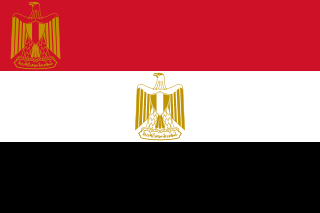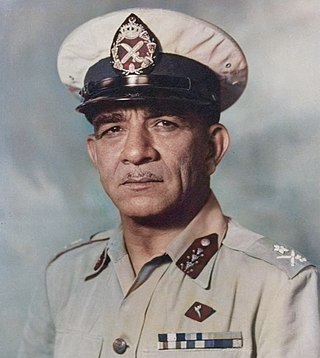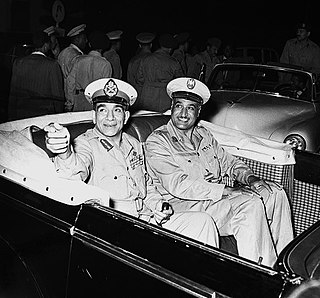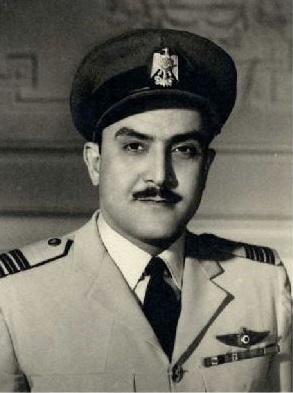Related Research Articles
The history of Egypt has been long and wealthy, due to the flow of the Nile River with its fertile banks and delta, as well as the accomplishments of Egypt's native inhabitants and outside influence. Much of Egypt's ancient history was a mystery until Egyptian hieroglyphs were deciphered with the discovery and deciphering of the Rosetta Stone. Among the Seven Wonders of the Ancient World is the Great Pyramid of Giza.

Gamal Abdel Nasser Hussein was an Egyptian military officer and politician who served as the second president of Egypt from 1954 until his death in 1970. Nasser led the Egyptian revolution of 1952 and introduced far-reaching land reforms the following year. Following a 1954 attempt on his life by a Muslim Brotherhood member, he cracked down on the organization, put President Mohamed Naguib under house arrest and assumed executive office. He was formally elected president in June 1956.

Fuad II, or alternatively Ahmed Fuad II, is a member of the Egyptian Muhammad Ali dynasty. As an infant, he formally reigned as the last King of Egypt and the Sudan from July 1952 to June 1953, when he was deposed.

The President of the Arab Republic of Egypt is the executive head of state of Egypt and the de facto appointee of the official head of government under the Egyptian Constitution of 2014. Under the various iterations of the Constitution of Egypt following the Egyptian Revolution of 1952, the president is also the supreme commander of the Armed Forces, and head of the executive branch of the Egyptian government. The current president is Field Marshal Abdel Fattah el-Sisi, who has been in office since 8 June 2014.

Mohamed Bey Naguib Youssef Qutb El-Qashlan, also known as Mohamed Naguib, was an Egyptian military officer and revolutionary, who along with Gamal Abdel Nasser, was one of the two principal leaders of the Free Officers movement of 1952 that toppled the monarchy of Egypt and the Sudan, leading to the establishment of the Republic of Egypt, and the independence of Sudan, and eventually South Sudan in 2010.

Damat Prince Muhammad Abdel Moneim Beyefendi was an Egyptian prince and heir apparent to the throne of Egypt and Sudan from 1899 to 1914. Upon the abdication of King Farouk following the Egyptian Revolution of 1952, he served as Regent for King Ahmed Fuad II until the declaration of the Republic of Egypt and abolition of the Egyptian and Sudanese monarchy in 1953.

The Egyptian revolution of 1952, also known as the 1952 coup d'état and 23 July Revolution, was a period of profound political, economic, and societal change in Egypt. On 23 July 1952 the revolution began with the toppling of King Farouk in a coup d'état by the Free Officers Movement. This group of army officers was led by Mohamed Naguib and Gamal Abdel Nasser. The Revolution ushered in a wave of revolutionary politics in the Arab World, and contributed to the escalation of decolonisation, and the development of Third World solidarity during the Cold War.
The Revolutionary Command Council was the body established to supervise the Republic of Egypt and Anglo-Egyptian Sudan after the Revolution of 1952. It initially selected Ali Maher Pasha as Prime Minister, but forced him to resign after conflict over land reform. At that time, the Council took full control of Egypt. The RCC controlled the state until 1954, when the Council dissolved itself.

Egypt, officially the Arab Republic of Egypt, is a transcontinental country spanning the northeast corner of Africa and the Sinai Peninsula in the southwest corner of Asia. It is bordered by the Mediterranean Sea to the north, the Gaza Strip of Palestine and Israel to the northeast, the Red Sea to the east, Sudan to the south, and Libya to the west. The Gulf of Aqaba in the northeast separates Egypt from Jordan and Saudi Arabia. Cairo is the capital and largest city of Egypt, while Alexandria, the second-largest city, is an important industrial and tourist hub at the Mediterranean coast. At approximately 100 million inhabitants, Egypt is the 14th-most populated country in the world, and the third-most populated in Africa.

The Order of the Nile was established in 1915 and was one of the Kingdom of Egypt's principal orders until the monarchy was abolished in 1953. It was then reconstituted as the Republic of Egypt's highest state honor.

The Kingdom of Egypt was the legal form of the Egyptian state during the latter period of the Muhammad Ali dynasty's reign, from the United Kingdom's recognition of Egyptian independence in 1922 until the abolition of the monarchy of Egypt and Sudan in 1953 following the Egyptian Revolution of 1952. Until the Anglo-Egyptian treaty of 1936, the Kingdom was only nominally independent, as the United Kingdom retained control of foreign relations, communications, the military, and Sudan. Officially, Sudan was governed as a condominium of the two states; however, in reality, true power in Sudan lay with the United Kingdom. Between 1936 and 1952, the United Kingdom continued to maintain its military presence, and its political advisers, at a reduced level, which resulted in the increase of Egyptian sovereignty and independence.

Contact between Egypt and Sudan goes back to trade and conflict during ancient times. In 1820, Egypt conquered Sudan, and continued to occupy the country, later as a condominium under the British, until Sudan declared Independence in 1956. Sudan later joined the Arab League, of which Egypt is a founding member. Relations between successive governments in Egypt and Sudan have warmed and cooled relations at various times. Relations today are cordial, but tensions remain.
The History of Republican Egypt spans the period of modern Egyptian history from the Egyptian Revolution of 1952 to the present day, which saw the toppling of the monarchy of Egypt and Sudan, the establishment of a presidential republic, and a period of profound economic, and political change in Egypt, and throughout the Arab world. The abolition of a monarchy and aristocracy viewed widely as sympathetic to Western interests, particularly since the ousting of Khedive Isma'il Pasha, over seven decades earlier, helped strengthen the authentically Egyptian character of the republic in the eyes of its supporters.

Gamal Salem was an Egyptian military officer and prominent member of the Egyptian Free Officers who led the Egyptian Revolution of 1952 that toppled the monarchy of Egypt and Sudan. Prior to the Revolution, he served as an officer in the Royal Egyptian Air Force.

Abdel Latif Boghdadi or Abd el-Latif el-Baghdadi was an Egyptian politician, senior air force officer, and judge. An original member of the Free Officers Movement which overthrew the monarchy in Egypt in the 1952 Revolution, Boghdadi later served as Gamal Abdel Nasser's vice president. The French author Jean Lacouture called Boghdadi "a robust manager" who only lacked "stature comparable to Nasser's." The two leaders had a falling out over Nasser's increasingly socialist and pro-USSR policies and Boghdadi subsequently withdrew from political life in 1964, although he mended ties with Nasser before the latter's death in 1970.
The decolonisation of Asia was the gradual growth of independence movements in Asia, leading ultimately to the retreat of foreign powers and the creation of several nation-states in the region.

Egypt–Syria relations refers to the bilateral relations between the Arab Republic of Egypt and the Syrian Arab Republic. Egypt has an embassy in Damascus. Syria has an embassy in Cairo. Both countries are members of the Arab League.

Hassan Ibrahim was an Egyptian Air Force officer and one of the founders of the Free Officers movement.

The Republic of Egypt was a state created in 1953 under the rule of Mohammed Naguib following the Egyptian revolution of 1952 in which the Kingdom of Egypt's Muhammad Ali dynasty came to an end. It was superseded in 1958 with the creation of the United Arab Republic.
References
- ↑ Clark, Michael (7 September 1952). "Naguib Seizes Rule in Egypt and Holds Ex-Aides of Farouk" (PDF). The New York Times. New York. Retrieved 12 November 2023.
- ↑ Doty, Robert (18 June 1953). "Egypt Now Republic; Naguib Her President" (PDF). The New York Times. New York. Retrieved 12 November 2023.
- ↑ "List of Persons". Foreign Relations of the United States, 1952-1954, The Near and Middle East, Volume IX, Part 2. Washington: Government Printing Office. 1986.
- ↑ "New Constitution Planned by Egypt" (PDF). The New York Times. New York. 8 December 1952. Retrieved 21 April 2024.
- ↑ "Cairo Supply Chief Quits" (PDF). The New York Times. New York. 16 June 1953. Retrieved 21 April 2024.